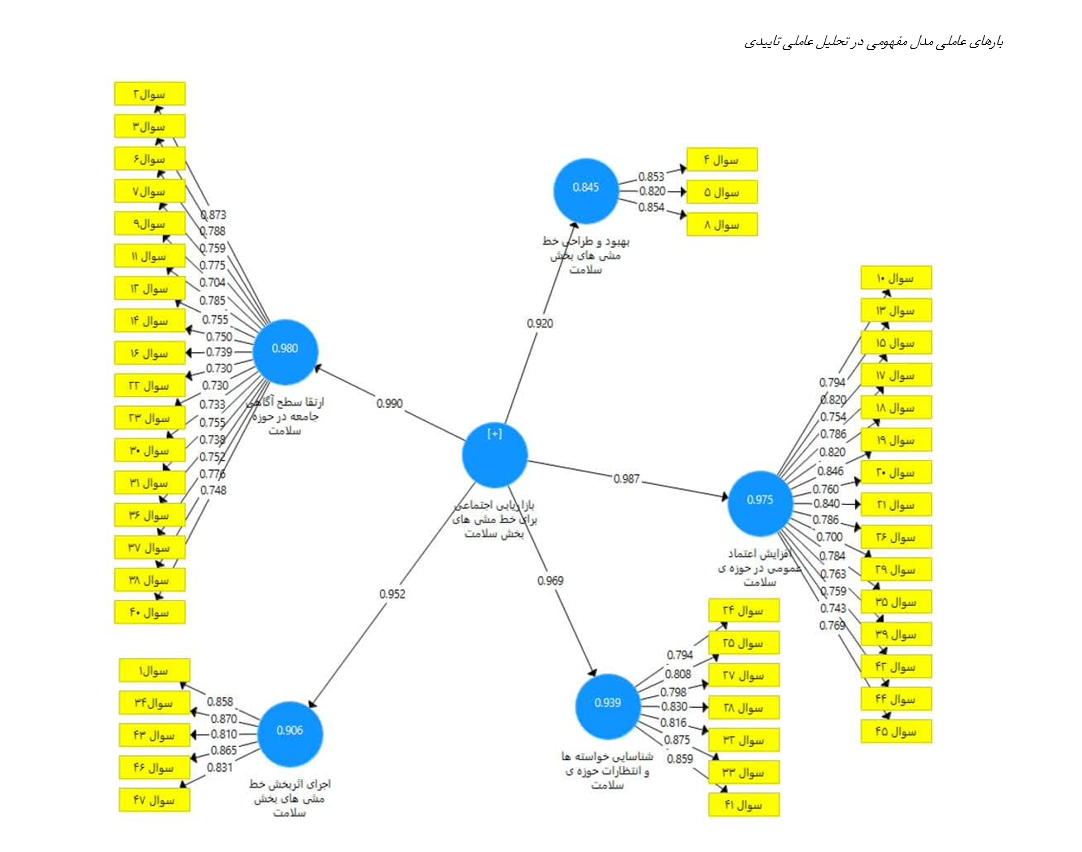Designing a Model for Improving Health Sector Policies Using a Social Marketing Approach
Keywords:
policy improvement, policy-making, social marketing, policy marketingAbstract
The present study was conducted with the aim of designing a model to improve health sector policies using a social marketing approach. In terms of purpose, this study is applied in nature, and in terms of the implementation process, it adopts a mixed-method (quantitative and qualitative) approach and employs the meta-synthesis method. In this study, in order to categorize the indicators of policy improvement through a social marketing approach, factor analysis techniques and a meta-synthesis approach were used. The statistical population of this study consisted of the reviewed texts, which were ultimately examined through three rounds of the Delphi method involving 17 experts and faculty members in the fields of management, marketing, policy-making, and health sector administration. The final concepts obtained in the qualitative section were then examined in the quantitative section, which included service recipients and providers in the health sector. To determine the sample size in the quantitative section, the simple random sampling method was used, and the sample size was calculated using the Cochran formula. To ensure reliability, 420 questionnaires were distributed and ultimately 400 were returned. Data were collected through field research using a questionnaire as the main instrument. The validity of the questionnaire was examined in terms of face and content validity, and the reliability of the measurement instrument was calculated using Cronbach’s alpha coefficient. The results indicated that the study identified 188 initial concepts, 28 categories, and 5 main dimensions. Finally, to design the social marketing model in the health sector, the following dimensions were obtained: (1) enhancing public awareness in the field of health, (2) identifying needs and expectations in the field of health, (3) increasing public trust in the field of health, (4) improving the design of health sector policies, and (5) effective implementation of health sector policies.
Downloads
References
Bagheri, A., Rousta, A., Forozandeh, L., & Asayesh, F. (2023). Presenting the Marketing Model of Health Tourism Development in Tehran Using Grounded Theory Method. Urban Economics and Planning, 4(3), 6-21. https://doi.org/10.22034/uep.2023.401857.1373
Hung, C. L., Wu, J. H., Chen, P. Y., Xu, X., Hsu, W. L., Lin, L. M., & Hsieh, M. C. (2023). Enhancing healthcare services and brand engagement through social media marketing: Integration of Kotler’s 5A framework with IDEA process. Information Processing and Management, 60(4), 103379. https://doi.org/10.1016/j.ipm.2023.103379
Koosha, M., Hezarjaribi, J., Allameh, H., Panahi, M. A., & Lalegani, A. (2025). Designing a Policy Model for Enhancing Social Health of the Elderly. Archives of Gerontology and Geriatrics Plus, 2(2), 1-10. https://doi.org/10.1016/j.aggp.2025.100149
Kopalle, P. K., & Lehmann, D. R. (2021). EXPRESS: Big data, marketing analytics, and public policy: Implications for health care. Journal of Public Policy & Marketing, 40, 453-456. https://doi.org/10.1177/0743915621999031
Mai, R., & Hoffmann, S. (2015). How to Combat the Unhealthy = Tasty Intuition: The Influencing Role of Health Consciousness. Journal of Public Policy & Marketing, 34(1), 63-83. https://doi.org/10.1509/jppm.14.006
Norollahi, M., & Hamid Khodadad, H. (2022). The Impact of Tourists on Physical Health and Social Well-Being in the Historical Village of Masuleh. Interdisciplinary Studies in Marketing Management, 1(2), 16-27.
Rahimi, M. K., Shafaghat, T., Beiginia, A., & Jafari, H. (2022). Investigating the Marketing Status of Healthcare Tourism of Selected Public and Private Hospitals in Yazd in 2021 [Research(Original)]. Journal of health research in community, 8(1), 60-68. http://jhc.mazums.ac.ir/article-1-697-en.html
Rastoka, J., Petković, S., & Radicic, D. (2022). Impact of Entrepreneurship on the Quality of Public Health Sector Institutions and Policies. International journal of environmental research and public health. https://doi.org/10.3390/ijerph19031569
Shrestha, L. S., Alsadoon, A., Prasad, P. W. C., Venkata, H. S., & Elchouemi, A. (2019). Rise of Social Media Marketing: A Perspective on Health Insurance. 2019 5th International Conference on Advanced Computing and Communication Systems, ICACCS 2019,
Smith, M. J., Buckton, C., & Patterson, C. (2023). User-generated content and influencer marketing involving e-cigarettes on social media: a scoping review and content analysis of YouTube and Instagram. BMC public health, 23, 530. https://doi.org/10.1186/s12889-023-15389-1
Tshuma, V., & Mpofu, S. (2024). Analysing Public Policies and Communication Strategies in Zimbabwe's Eye Healthcare Industry. In Public Sector Communication in the Digital Age (pp. 201-227). https://doi.org/10.36615/9781776489909-08
Udoh, I. A., & Willard, B. (2023). Community-Based Social Marketing: A Supplemental Approach to Improve Environmental Attitudes and Environmental Health in Nigeria. Environmental Communication, 17(2119), 134. https://doi.org/10.1080/17524032.2023.2175005

Downloads
Published
Submitted
Revised
Accepted
Issue
Section
License
Copyright (c) 2025 Farzaneh Sefid Dashti (Author); Mehraban Hadi Peykani; Akbar Etebarian (Author)

This work is licensed under a Creative Commons Attribution-NonCommercial 4.0 International License.










